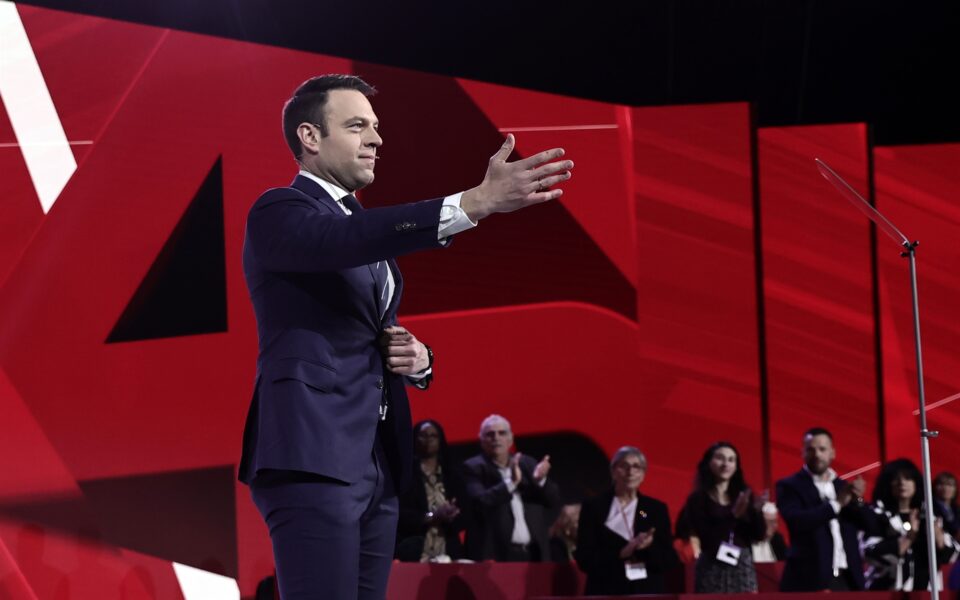Τsipras’ (and Kasselakis’) high-stakes gamble

The bomb dropped by former prime minister and SYRIZA leader Alexis Tsipras as the leftist party’s congress was about to start is a high-risk gamble both for his own political future and that of his successor, Stefanos Kasselakis. Following the latest developments, another SYRIZA split might be imminent.
In a perfectly orchestrated move that came as a shock to most, Tsipras published a statement, just as the conference was opening at the Tae Kwon Do Arena on Athens’ southern coast, criticizing the direction the party has taken and urging Kasselakis to seek a vote of confidence from party members.
“I think this is the only clean, honest and democratic solution to the Gordian knot we face,” Tsipras said, adding that he could not attend the congress, which, he claimed, was designed “to ignore the critical problems, in the name of a false optimism, and to pretend, all together, how loved we are.”
With his intervention, Tsipras derailed the fragile compromise between Kasselakis and top party officials achieved earlier this week, according to which, basically, the latter would wait for the party’s next big electoral failure before trying to push him out. The former party chief also rendered the congress meaningless and forced a new electoral process.
“Find me an opponent and let’s go,” 35-year-old Kasselakis said in response to the challenge. “Those who believe I was planted into SYRIZA’s leadership, they will see my roots. I appeal to my roots: SYRIZA’s members and people.”
“Anyone who thinks they can bolster a party that has crashed and split twice in a matter of a few months, can come and take over,” Kasselakis added.
“We have the paradox of a leader who came in as an outsider, came out of nowhere to win the party leadership and now, five months later, is entering a new electoral process,” Petros Ioannidis, a political analyst and founder of the firm About People, says of the latest developments in the ranks of the country’s main opposition party. “This is not something we’ve seen before; it is also indicative of SYRIZA’s stalemate,” he adds.
Catalytic move
‘We have the paradox of a leader who came in as an outsider to win the party leadership and now, five months later, is entering a new electoral process,’ political analyst Petros Ioannidis said
The new polls for the party’s leadership will likely be held on March 10 and Olga Gerovasili is slated as Kasselakis’ main challenger. A former minister of citizen protection, Gerovasili is a close associate of Tsipras and led a revolt against the current party president earlier this week.
Kasselakis, who had presented himself as Tsipras’ unofficial favorite five months ago, now has to repeat his triumph – but with the influential former leader against him.
“Undoubtedly, it is a catalyst that multiplies party developments,” says Lamprini Rori, an assistant professor in political analysis at the University of Athens.
Even though the move was not spontaneous but, rather, came after consultations within the party, it is risky.
“Risky because, if Kasselakis is defeated, then Tsipras will have confirmed his leverage within the party. But if Kasselakis is re-elected, this also shows the limits of Tsipras’ influence in the post-Tsipras era,” Rori says.
“In other words, it was a catalytic move by Tsipras, but also for Tsipras, as despite the fact that he will not be a candidate in the present year, it could prove to be a double-edged sword,” she adds.
Kasselakis had no other option but to respond to the direct challenge to his leadership, set by his predecessor but also by the party’s poor performance in public opinion polls.
However, Ioannidis argues that his actions have also been pushing the issue in this direction.
“Mr Kasselakis was right in saying that if the party was functioning properly, he would not be president. This argument has a basis and is convincing,” he says.
“Of course, it is also a high-risk move for Kasselakis,” adds Rori. “But it is also the only move that can put an end, even temporarily, to the huge turbulence within the party and allow a discussion about its political positions and identity.”





